Speakers
Opening Remarks
Luca Capogna, Professor and Department Head, Mathematical Sciences Department, WPI.
Plenary Speakers
Misha Kilmer, Professor and Chair, Department of Mathematics, Tufts University.

Title: The Case for T-Product Tensor Decompositions: Compression, Analysis and Reconstruction of Image Data
Abstract: Most problems in imaging science involve operators or data that are inherently multidimensional in nature, yet traditional approaches to modeling, analysis and compression of (sequences of) images involve matricization of the model or data. In this talk, we discuss ways in which multiway arrays, called tensors, can be leveraged in imaging science for tasks such as forward problem modeling, regularization and reconstruction, video analysis, and compression and recognition of facial image data. The unifying mathematical construct in our approaches to these problems is the t-product (Kilmer and Martin, LAA, 2011) and associated algebraic framework. We will see that the t-product permits the elegant extension of linear algebraic concepts and matrix algorithms to tensors, which in turn gives rise to new, highly parallelizable, algorithms for the imaging tasks noted above.
Bio: Misha Elena Kilmer is the William Walker Professor of Mathematics and Adjunct Professor of Computer Science at Tufts University. She currently serves as Chair of the Tufts Department of Mathematics. Prof. Kilmer obtained her Ph.D. in Applied Mathematics from the Univ. of Maryland, College Park, in Dec. 1997. She served as Visiting Scientist in the ECE Dept. of Northeastern Univ. from Jan. 1998 until departing for Tufts in the fall of 1999. Her research interest is in numerical (multi-)linear algebra. She specializes in the development of fast algorithms for solving large-scale, forward and inverse problems, as well as on theoretical and applied aspects of tensor computation.
She is a 2001 recipient of the Tufts Undergraduate Initiative in Teaching Award and was promoted directly to Full Professor from the rank of Assistant Professor. She is a member of AWM and SIAM and an associate editor for SIAM Journal on Scientific Computing. She was recently tapped to serve as Section Editor for SIAM Review's Research Spotlight's section. She is the author of numerous refereed articles and conference proceedings papers appearing in a wide range of computational math and engineering publications. Her work has been or is being funded by the NSF, NIH, IARPA and DARPA
Gigliola Staffilani, Professor, Department of Mathematics, MIT.
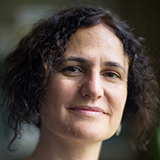
Title: Nonlinear wave phenomena: the ubiquitous dispersive equations.
Abstract: In this talk I will introduce one of the most famous PDE of dispersive type: The Nonlinear Schrodinger equation. I will give an example of where it comes from, I will explain why it is difficult to study it and I will present some of the tools that we use to analyze it.
Bio: Gigliola Staffilani is the Abby Rockefeller Mauzé Professor of Mathematics since 2007. She received the B.S. equivalent from the University of Bologna in 1989, and the M.S. and Ph.D. degrees from the University of Chicago in 1991 and 95. Following a Szegö Assistant Professorship at Stanford, she had faculty appointments at Stanford, Princeton and Brown, before joining the MIT mathematics faculty in 2002. Professor Staffilani is an analyst, with a concentration on dispersive nonlinear PDEs. At Stanford, she received the Harold M. Bacon Memorial Teaching Award in 1997, and was given the Frederick E. Terman Award for young faculty in 1998. She was a Sloan fellow from 2000-02.
In 2013 she was elected member of the Massachusetts Academy of Science and a fellow of the AMS, and in 2014 fellow of the American Academy of Arts and Sciences. In 2017 she received a 2017 Guggenheim fellowship and a 2017 Simons Fellowship in Mathematics. As a member of the Department's edX group, Gigliola received the inaugural MITx Prize for Teaching and Learning in MOOCs by the MIT Office of Digital.
Tutorials
Andrea Arnold, Assistant Professor, Department of Mathematical Sciences, WPI.
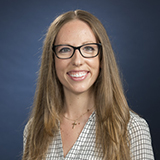
Title: Nonlinear Filtering Methods for State and Parameter Estimation.
Abstract: This tutorial will give an introduction to Bayesian filtering methods for state and parameter estimation. In particular, we will derive the classic Kalman filter equations for state estimation from the Bayesian perspective and discuss extensions of the methodology for nonlinear systems with unknown parameters. We will demonstrate the effectiveness of the methods on several numerical examples, including applications from the life sciences.
Bio: Dr. Arnold received a B.S. in Mathematics at Duquesne University in 2009 and Ph.D. in Applied Mathematics at Case Western Reserve University in 2014. She completed a postdoctoral fellowship with the Research Training Group in Mathematical Biology at North Carolina State University before joining the faculty at Worcester Polytechnic Institute in Fall 2017. Dr. Arnold’s research is in the field of inverse problems and uncertainty quantification. She is interested in the design and analysis of efficient and robust nonlinear filtering algorithms for state and parameter estimation within the Bayesian inference framework and the application of such algorithms in analyzing real-world data.
Kathryn Lindsey, Assistant Professor, Department of Mathematics, Boston College.
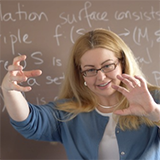
Title: Shapes of Julia sets.
Abstract: Julia sets are a type of fractal associated with dynamical systems on the complex plane. It is natural to wonder what the possible "shapes" of Julia sets are. For example, could you find a Julia arising from a polynomial set that "looks like" a cat? or a car? or a donut? It turns out that there is a simple characterization of which shapes can be approximated (in a strong sense) by polynomial Julia sets. I will discuss this result, and show some interesting images of Julia sets.
Bio: I am an assistant professor in the Dept. of Mathematics at Boston College. My research combines dynamical systems, complex analysis, and low-dimensional geometry/topology. I received a B.A. from Williams College, a Ph.D. from Cornell University, and spent 3 years as a Dickson Instructor/NSF Postdoc at the University of Chicago.
Emina Soljanin, Professor, Department of Electrical & Computer Engineering, Rutgers University.
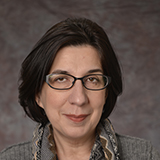
Title: Codes for data storage with queues for data access.
Abstract: Large volumes of data, which are being collected for the purpose of knowledge extraction, have to be reliably, efficiently, and securely stored. Retrieval of large data files from storage has to be fast (and often anonymous and private). This tutorial is concerned with big data storage and access, and its relevant mathematical disciplines: algebraic coding and queuing theory. Coding and queuing theory have been essential in providing solutions for reliable, efficient, and secure telecommunications, but these solutions are inadequate when storing and moving very large files across networks is necessary. The purpose of this tutorial is to highlight the usually overlooked aspects of data science, namely its infrastructure, where a number of fundamental math disciplines are important, and many mathematicians could contribute. Fairly basic algebra, combinatorics, and probability will be used to explain coding and queuing concepts of interest for big data infrastructure in order to make the tutorial accessible to undergraduates.
Bio: Emina Soljanin is a Professor at Rutgers University. Before moving to Rutgers in January 2016, she was a (Distinguished) Member of Technical Staff for 21 years in the Mathematical Sciences Research of Bell Labs. She works as a coding, information, and, more recently, queueing theorist. Her interests and expertise are wide. Over the past quarter of the century, she has participated in numerous research and business projects, as diverse as power system optimization, magnetic recording, color space quantization, hybrid ARQ, network coding, data and network security, and quantum information theory. Dr. Soljanin served as the Associate Editor for Coding Techniques, for the IEEE Transactions on Information Theory, on the Information Theory Society Board of Governors, and in various roles on other journal editorial boards and conference program committees. She is a co-organizer of the DIMACS 2001-2005 Special Focus on Computational Information Theory and Coding and 2011-2015 Special Focus on Cybersecurity. She is a 2017 outstanding alumnus of the Texas A&M School of Engineering, an IEEE Fellow, a 2016/17 Distinguished Lecturer for the IEEE Information Theory Society, and is currently serving as the Vice President for the society.
Gwen Spencer, Assistant Professor, Department of Mathematics and Statistics, Smith College.
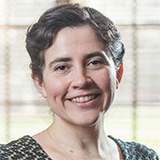
Title: Influence Maximization in Networks: Spread Models and Optimization Methods.
Abstract: Sociologists first introduced the study influence in social networks during the 70's. This inspired mathematicians and computer scientists to propose a number of models about the spread of information and behavior in networks. Given a particular spread process, a natural question is how to choose a small set of individuals who are highly-influential (in the sense that their behavior change could cause a large cascade of behavior in the network). This optimization problem has attracted a great deal of theoretical study, but many "scientific facets" of the problem remain open. I'll mention several formal models of spread, mention algorithmic results were they are known, and point out contemporary challenges suggested by human studies in behavioral economics and noisy inputs. Better understanding of this planning problem has the potential to fuel industry efforts in viral marketing, increase the reach of campaigns to promote healthy behaviors, and inform management practices about how to make cooperation more robust.
Bio: Gwen Spencer earned a master's and PhD in Operations Research at Cornell University. Prior to joining Smith College, she was a Neukom Institute postdoctoral fellow at Dartmouth College. Spencer's research is in combinatorial optimization, approximation algorithms (algorithms whose performance is provably near-optimal), and network science. She is particularly motivated by generalizations of classical models that accommodate stochastic inputs and uncertain impacts of interventions in networks.
Panelists
Moderator: Misha Kilmer, Professor and Chair, Department of Mathematics, Tufts University.
Linda Ness, Part-time Research Scientist, DIMAC, Rutgers University.
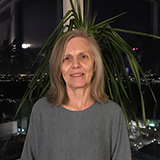
Bio: Linda Ness is a mathematician and applied mathematician with academic, industrial and DoD applied research experience. She is currently co-PI of a DARPA funded project at Rutgers: Multiscale Modeling, Simulation and Analysis of Transmedial Social Environments. Her current affiliation is with DIMACS, the Rutgers Center for Discrete Mathematics and Computer Science as a Visiting Scholar. She has been conducting research on mathematical multiscale representations of data for the last 10 years. Recently she served on the organizing committees for two data science workshops at ICERM, the NSF-funded Institute for Computational and Experimental Research in Mathematics: Mathematics in Data Science (2015) and the WiSDM Women in Data Science and Mathematics Research Collaboration Workshop (2017). Linda has a B.A. in mathematics from St. Olaf College (1969), a Ph.D. in mathematics from Harvard in algebraic and differential geometry (1974), and a Master’s in Computer Science from the University of Texas (1987). As an undergraduate at St. Olaf College she participated in one of the first REU programs (Counterexamples in Point Set Topology). After receiving her Ph.D. she was an academic mathematician for approximately 10 years. After receiving he Master’s in Computer Science, she was a researcher in the Applied Research Lab at Applied Communications Sciences (formerly Telcordia and Bellcore) for 28 years. Her roles there included: Director of an Enterprise Integration Research Group, Program Manager of the Applied Research Tactical Research Program, Chief Research Scientist, co-PI and PI of an AFOSR project and co-PI of an ONR project.
Sarah Olson, Associate Professor, Department of Mathematical Sciences, WPI.
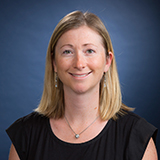
Bio: Sarah Olson is an Associate Professor in the Department of Mathematical Sciences at WPI. She received her PhD at NC State University in 2008 and completed a postdoc at Tulane University in 2011. Her research interests are in the areas of scientific computing, mathematical biology, and fluid dynamics. Many of these projects have been funded by the National Science Foundation (including a recent CAREER grant) and involve collaborations with researchers in the biological sciences. The main aim of this research is to develop new computational methods that couple multiple scales of modeling that can be used to answer clinically relevant questions. At WPI, she has mentored over 20 undergraduate projects and has been actively mentoring graduate students and postdocs.
Gigliola Staffilani, Professor, Department of Mathematics, MIT.
Chad Topaz, Professor, Department of Mathematics and Statistics, Williams College.
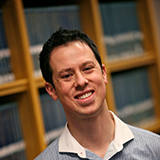
Bio: Professor of Mathematics Chad Topaz (A.B. Harvard, Ph.D. Northwestern) is an applied mathematician at Williams College. His research examines complex systems using tools from data science, modeling, analysis, topology, geometric dynamical systems, numerical simulation, and experiment. Chad’s honors include a New Directions Research Professorship at the Institute for Mathematics and its Applications, a Kavli Frontiers Fellowship from the National Academy of Sciences, a Board of Trustees Award from Macalester College, the 2013 Outstanding Paper Award of the Society for Industrial and Applied Mathematics, the Robert Sorgenfrey Distinguished Teaching Award in mathematics at UCLA, and the Rossmann Excellence in Teaching Award at Macalester.
Lalitha Venkataramanan, Scientific Advisor, Schlumberger-Doll Research.

Bio: Lalitha Venkataramanan is a Scientific Advisor at Schlumberger Doll Research and is based in Cambridge, MA. She has worked in the field of measurement inversion and interpretation for over 18 years. She has managed a research program on inversion of multiple measurements to estimate rock and fluid properties. Her research interests include forward modeling and inversion of nuclear magnetic resonance, dielectric and optical measurements obtained from downhole and laboratory data as well as optimization, optimal experimental design and probability and stochastic processes. Trained as an Electrical Engineer, she obtained her M.S and Ph.D. degrees from Yale University in 1998. She has over 10 granted patents and 15 pending patent applications, over 25 refereed Journal papers. She has given several invited presentations about her work at Universities and organized panel discussions and workshops for careers outside academia. She is a board member of SIAM industry committee.
Suzanne Weekes, Professor, Department of Mathematical Sciences, WPI.
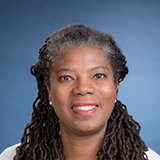
Bio: Suzanne L. Weekes is a Professor of Mathematical Sciences at WPI. She holds a B.S. in Mathematics from Indiana University, a PhD in Mathematics and Scientific Computing from the University of Michigan and did her post-doctoral work at Texas A&M University. Her research work is in numerical methods for differential equations including applications to dynamic materials and cancer growth. She is involved in various initiatives connecting the academic mathematics community to work done in business, industry, and government. Prof. Weekes co-directs the PIC Math Program.
Invited Speaker
Catherine Roberts, Executive Director of the American Mathematical Society.
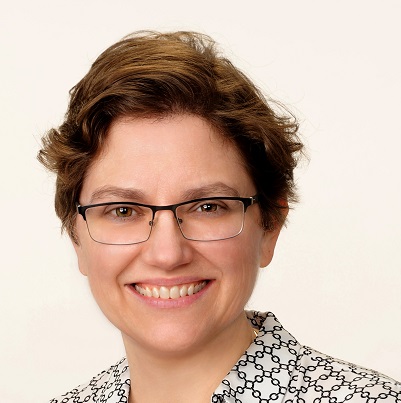
Title: Career Benefits to Engagement in Professional Societies.
Bio: Catherine A. Roberts is the Executive Director of the American Mathematical Society. She is also on the faculty at College of the Holy Cross and Brown University. She earned her doctorate in applied mathematics and engineering sciences at Northwestern University, where she studied nonlinear Volterra equations. She spent ten years as the Chief Editor for the journal Natural Resource Modeling.